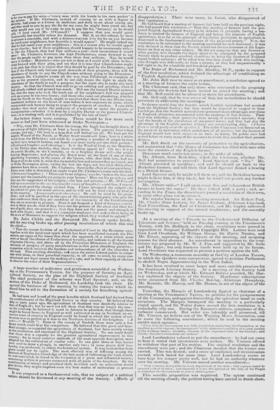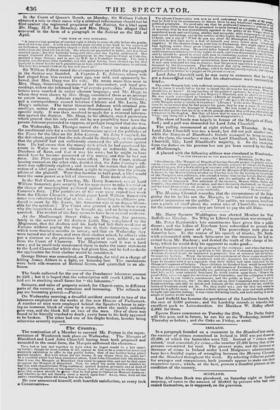At a meeting of the " Friends to the Unob , trineted
Diffusion of Literature and Science," held on Tuesday evening at the Freemason's Tavern, with Dr. Birkbeck the chair, resolutions were passed in opposition to Sergeant Talfourd's Copyright Bill. Letters were read from Lord Ossulston, Sir William Houle, Sir Harris Nicolas, and Mr. Ewalt, approving of the objects of the meeting, and assigning reasons for their absence. An amendment in opposition to the reso- lutions was proposed by Mr. W. J. Fox, arid supported by Mr. Seale and Dr. Epps ; but only fourteen hands were held up in its favour. Lord Ossulston was requested to present a petition against the bill.
On Wednesday, a numerous assembly at theCity of London Tavern, in which the Quakers were conspicuous, agreed to petition Parliament to abolish Negro Apprenticeship in the West Indies.
It has been resolved to erect larger and more suitable premises for the Southwark Literary Society. At a meeting of the Society held on Wednesday, and at which Mr. Edward Hulwcr presided, Mr. Har- vey explained the objects of the Society. Handsome subscriptions were announced from Mr. Charles Barclay, Alderman Humphery, Mr. Kemble, Mr. Harvey, and Mr. Hawes, in aid of the object of the meeting.
Yesterday, the Marquis of Londonderry figured as chairman of a meeting at the Freemason's Tavern, to petitions for the postponement of the Coronation, and against diminishing the splendour usual on such occasions. The Marquis harangued the meeting in a particularly stupid speech, and Sir Walter James unmoved the first resolution in a remarkably silly one. During the Baronet's address, symptoms of dis- turbance commenced. But order was tolerably well preserved, till Mr. Vincent, we believe one of the Working Men's Association, rose to move the following amendment ; which he read to the meeting amidst much uproar_
First, that the Gocernment a as hilly justified in conducting the Coronation nt the
smallest tio,sible expeose, in consequence of the distressed e lit in of a peat portion ofthe wicking classes; secondly, because of the depressed state of the revenue; and thirdly, because Coronations are useless."
Lord Londonderry refused to put the amendment : he bud not come to hear it stated that coronations were useless. Mr. Vincent offered to withdraw that part of his motion. The original resolution and the amendment were put ; and the Chairman decided that the former was carried. This was denied; and a scene of confusion and recrimination ensued, which lasted for some time. Loral Londonderry seems to have kept his temper pretty well, but he had no authority whatever over the meeting. Mr. Vincent moved another amendment- - That eemi)ny is requisite in every department rit the state ; that expense cannot be incurred triqvud Ca rati,m ; and therefore it is run the interact or the duty of the People to stimulate the Government to acts In extrmagance.- 'fills sensible proposition was negatived. The uproar continued till the meeting closed; the petition having been carried in dumb show. In the Court of Queen's Bench, on Monday, Sir William Follett obtained a rule to show cause why a criminal information should not be Sled against the registered proprietor of the Satirist, for a libel upon Mr. Hogg, M.P. for Beverley, and Mrs. Hogg. The alleged libel appeared in the form of a paragraph in the Satirist on the 22d of April.
"THE AVM OE TWO HUSBANDS.
" A very enr:ous question of marital right is likely to come shortly before the gentle. men of the lung robe. A lady was married some twenty years back to the captain of an I aeliaman, and sabsramently eloped to Italy with it friend of the late Lord ByT011. with whom she lived till his death. She afterwards proceeded to India, and was there married again ; her first husband being still elite, and she legally undivorced. Her second husband tilled a lucrative appointment in the Supremo Court at Calcutta, realized is large fortune, and is now an M.P. for a Yorkshire borough. The lady's identity was for some time doubtful; but this point having been cleared up, the first husband is about to take such proceedings as may, under the cheumst tunes, be advised. The lady has several ebildien by her first marti pee."
Sir William Follett stated the circumstances on which the paragraph in the Satirist MO founded. A Captain J. E. Johnson, whose wife had eloped from him several years ago, was told, and apparently be- lieved, that Mrs. Hogg was his wife. He wrote more than once to Mrs. Hogg, threatening exposure of her misconduct, and legal pro- ceedings, unless she informed him " of certain particulars." Johnson's letters were couched in rather obscure language ; and Mr. Hogg, to whom they were shown by Mrs. Hogg, considered them as an attempt to extort money. Johnson employed an attorney named Chilcote ; and a correspondence ensued between Chilcote and Mr. Utile, Mr. Hogg's solicitor. The latter threatened Johnson with criminal pro- ceedings, unless the annoyance was discontinued ; but could get no specific reply. It was then resolved to apply for a criminal informa- tion against the Satirist. Mr. Hogg. in his affidavit, stated particulars which proved that his lady could not by any possibility have been the person Johnson pretended to suppose, or perhaps imagined that she was.
On Wednesday, Mr. Thesiger moved the Conti to make absolute the conditional rule for a criminal information against the publisher of the Times for the libel on Sir John Conroy. Sir John Campbell, for the defendant, argued that the rule should be discharged, on the ground
that the plaintiff had not sufficiently answered the allegations against
him. Ile had sworn that the money with which he had purchased his estate in Wales was not obtained directly or indirectly from the Dutchess of Kent, and that it was his own ; but he ought to have stated bow lie became possessed of this money, and this he had not done. Mr. Platt argued to the same effect. But the Court, without hearing counsel on the other side, decided that Sir John Conroy's affi- davit was sufficiently explicit ; and scouted the notion that the publi- cation of a libel gave the defendant a right to inquire into the private affairs of the plaintiff. Were that doctrine to hold good, a libel would bare the same power as a bill cf discovery. Rule made ab.ulute.
In the Bail Court, on Thursday, Mr. Henry Somerset, son of Lord William Somerset, gave security for his appearance to take his trial on the charge of mato:laughter proferred against him on the v rdict of a Coroner's Jury. [The particulari of the case were copied last week from the Chester Chronic& ; in which paper Lord William Somerset's name v::s substituted for that of his son. According to affidavits pro- duced in court by Mr. Jervis, Mr. Somerset was in no degree blame- able for the accident.' The Court also granted a rule to show cause why the inquisition should not be brought up, and on being returned, quashed. The verdict of the Jury seems to have been agAinst evidence.
At the Marlborough Street Office, on Thursday, five persons, lately in the service of Sir Andrew Leith Flay, complained to the Magistrate, that Sir Andrew mid his Lady had left their residence at Fulham without paying the wages due to their domestics, sonic of which were fourteen months in arrear; and that on Wednesday they were turned out of doors, and even their clothes seized, by officers who put a distress on the premises for payment of rent, under un order from the Court of Chancery. The Magistrate said it was a hard case ; and he could only recommend them to make the same statement to the Lord Chancellor which they had given him, and he had no doubt the application for their clothes would be considered.
George Driver was committed, on Thursday, for trial on a charge of killing James Abbott in a fight, on Saturday last. The combatants were both silk-weavers of Bethnal Green, and quarrelled in an ale- house.



























 Previous page
Previous page